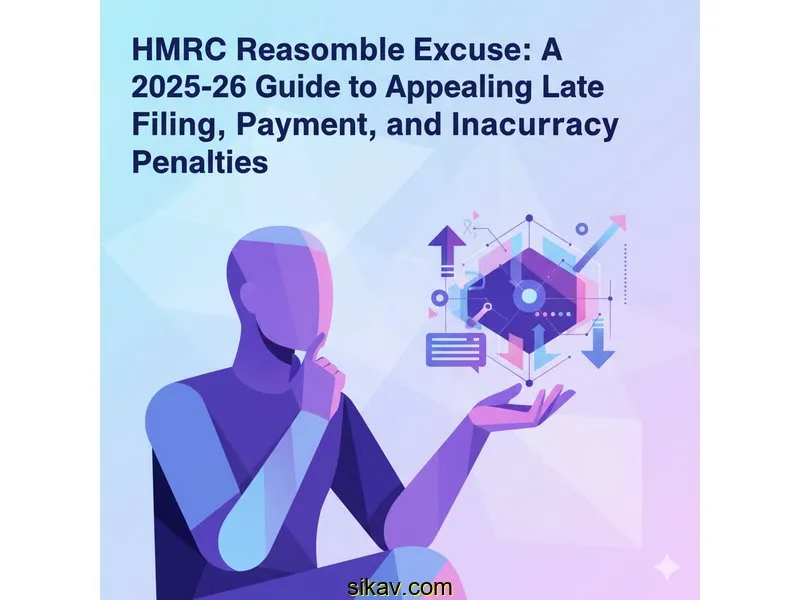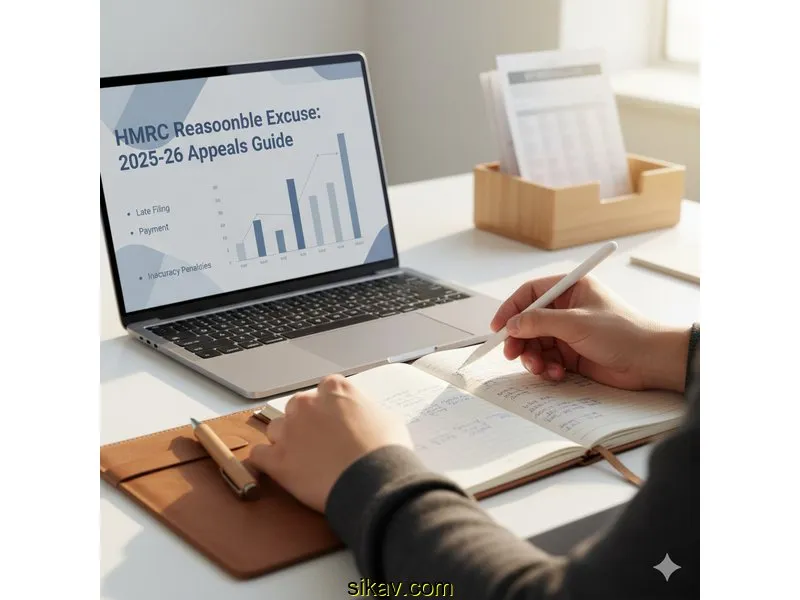
Picture this: You've just logged into your HMRC account to check your tax summary, and your stomach drops. You see a £100 penalty charge. You filed your Self Assessment return two days late—not out of avoidance, but because of a sudden family emergency that consumed all your time and attention. If you've ever faced this, your first thought is likely: "This isn't fair. Can I appeal this?"
This is where the concept of "Reasonable Excuse" becomes one of the most important—and most misunderstood—parts of the UK tax system. It's HMRC's official channel for acknowledging that sometimes, life gets in the way. However, navigating what HMRC considers "reasonable" versus what they dismiss as a simple mistake can be a confusing and stressful process. Many people simply pay the penalty, unaware they may have a valid case for appeal.
Key Takeaways
- Three Penalty Types: 'Reasonable Excuse' can apply to penalties for Late Filing, Late Payment, and Inaccurate Returns, but the criteria for each are different.
- The Core Test: A reasonable excuse must be an unexpected or unusual event that was unforeseeable or beyond your control (HMRC, 2025). Being busy, not understanding the rules, or lacking funds are generally *not* accepted.
- Evidence is Everything: A successful appeal almost always requires documentary evidence (e.g., a doctor's note, hospital letter, death certificate, or software error logs).
- Key Data Point: For the 2022-23 tax year alone, HMRC issued over **1.1 million late filing penalties** (HMRC, 2024). This highlights how many people are affected by this single deadline.
- When to Act: You typically have **30 days** from the date of the penalty notice to submit your appeal, so acting quickly is critical.
- Disclaimer: This article provides informational guidance on HMRC's penalty and appeal process as of November 2025. It is not financial or legal advice. Tax rules are complex; always consult a qualified accountant or tax advisor for your specific situation.
What Does HMRC *Actually* Mean by 'Reasonable Excuse'?
First, let's clarify what a "reasonable excuse" is—and what it isn't. HMRC’s own compliance handbook (CH71500) states that a reasonable excuse is "normally an unexpected or unusual event that is either unforeseeable or beyond the person’s control" (HMRC, 2025). The key word is *unexpected*. HMRC expects you to plan for your tax obligations, as the deadlines are known a year in advance.
Think of it like appealing a parking ticket. "I didn't see the sign" (ignorance of the rules) or "I was in a rush" (being busy) will almost certainly fail. However, "My car broke down suddenly and unexpectedly" or "I was rushing a family member to the hospital for an emergency" (an unforeseeable event beyond your control) has a much stronger chance of success, especially with proof.
Common examples HMRC may accept (with evidence): * Serious or life-threatening illness of you or a close relative near the deadline. * The death of a close partner or family member just before the deadline. * An unexpected and serious IT or software failure on the deadline day (this is hard to prove and must be widespread, not just your personal laptop failing). * A fire, flood, or natural disaster that destroyed your records or prevented you from filing. * Serious mental health issues that prevented you from managing your affairs.
Examples HMRC will almost *never* accept: * "I forgot the deadline." * "I was too busy with work." * "I didn't understand the rules." * "I couldn't afford to pay my tax bill." (This is *not* a reasonable excuse for late payment, though you can set up a 'Time to Pay' arrangement). * "I left it all to my accountant, and they missed the deadline." (HMRC views the responsibility as ultimately yours). * "I sent my paper return by post on 31 January." (The deadline for paper returns is 31 October; only online returns are due 31 January).
The Three Penalty Types: How 'Reasonable Excuse' Applies Differently
A critical mistake taxpayers make is assuming "reasonable excuse" is a one-size-fits-all concept. It applies very differently depending on *which* penalty you've received. Let's explore the three main scenarios a freelancer, landlord, or sole trader might face.
| Penalty Type | Why It's Issued | How 'Reasonable Excuse' Applies | Common Scenario That *May* Be Accepted |
|---|---|---|---|
| Late Filing Penalty | Your Self Assessment return was submitted after the 31 January deadline (for online returns). | This is the 'classic' use. An event must have prevented you from filing on time. The excuse must cover the entire period from when you intended to file to the deadline. | "I was in the hospital with appendicitis from 28 January to 3 February. I filed my return on 4 February, as soon as I was able. I have a hospital discharge letter as proof." |
| Late Payment Penalty | Your tax bill (and first payment on account) was paid after the 31 January deadline. | This is much harder to prove. HMRC expects you to plan your finances. "Lack of funds" is explicitly *not* a reasonable excuse. | "My bank's entire national online payment system had a documented, widespread outage on 31 January that prevented my transfer. I paid on 1 February as soon as it was fixed." |
| Inaccuracy Penalty | You filed on time, but your return contained an error due to 'carelessness'. | This is different. You must prove you took "reasonable care" to get it right, but an error still occurred. 'Reasonable excuse' can be claimed if an event prevented you from taking reasonable care. | "My accountant, to whom I provided all correct bank statements, made a data entry error. As a non-accountant, I couldn't have been expected to spot this specific error." |
As the table shows, an excuse that works for late filing (e.g., "I was ill") may not work for late payment if you were well enough to make other payments or manage your bank account. The key is that the excuse must be directly linked to the failure.
Step-by-Step: How to Appeal an HMRC Penalty
If you believe you have a valid reasonable excuse and the evidence to back it up, here is the practical process for making your appeal.
Step 1: Check Your Deadline and Method
You must appeal within 30 days of the date on your penalty notice. Don't delay. You can appeal in two main ways:
- Online: For late filing penalties, you can often appeal via your HMRC online account. This is the fastest method.
- By Post: You can fill out form SA370 ('Appeal: Self Assessment') and post it. Always keep a copy and get proof of postage.
Step 2: Gather Your Evidence (The Most Crucial Part)
Your word is not enough. You must provide clear, dated evidence that supports your claim.
- For Illness: A doctor's note, hospital admission/discharge papers, or a letter from a medical professional. This must state the dates you were incapacitated and confirm the severity.
- For Bereavement: A copy of the death certificate. HMRC is generally sympathetic but will check the date and your relationship to the deceased.
- For Technical Issues: This is the hardest to prove. You'll need screenshots of the error message (with date and time), a support ticket reference number, or a public statement from the software provider (or HMRC) confirming a system-wide outage.
Step 3: Write Your Appeal Letter
Be clear, concise, and professional. Do not be emotional or aggressive.
- State the facts: "I am appealing the £100 late filing penalty (reference XXX) dated 5 February 2026."
- Explain the excuse: "I was unable to file my return by 31 January because I was admitted to hospital for emergency surgery on 29 January 2026."
- Provide the timeline: "I was discharged on 4 February and filed my return on 5 February, the earliest date I was practically able to."
- List your evidence: "Please find enclosed a copy of my hospital discharge letter, which confirms these dates."
Step 4: What Happens Next (HMRC Review)
HMRC will review your appeal and the evidence. They will send you a letter either accepting your appeal and cancelling the penalty, or rejecting it and explaining why. If they reject it, don't panic—you have more options.
When HMRC Rejects Your Appeal: ADR and the Tax Tribunal
If HMRC sends you a letter rejecting your appeal, your journey isn't necessarily over. You have two further steps.
1. Request an Independent Review: You can ask for another HMRC officer (who was not involved in the first decision) to review your case. This is still an *internal* review, but it provides a fresh pair of eyes. You must request this within 30 days of the rejection letter.
2. Appeal to the First-tier Tribunal (Tax): If the internal review also fails, you can appeal to an independent body: the First-tier Tribunal. This is a formal legal process. Think of the HMRC review as the 'first round'. The Tribunal is the final, independent court where a judge reviews the case from scratch. According to a 2024 review by the **Low Incomes Tax Reform Group (LITRG)**, many taxpayers are unaware of this multi-stage appeal process and give up after the first rejection, often unnecessarily.
Before going to a tribunal, you can also consider HMRC's **Alternative Dispute Resolution (ADR)** service. This involves an impartial HMRC mediator who tries to help both you and HMRC find an agreement without the formality and stress of a court hearing.
Common Questions About HMRC Reasonable Excuses

Based on questions I've seen across UK personal finance forums, here are the most common points of confusion cleared up.
What's the difference between a 'reasonable excuse' and 'reasonable care'?
This is a crucial distinction. * Reasonable Excuse is a defence against penalties for being *late* (late filing or late payment). It's about an *event* preventing you from acting on time. * Reasonable Care is a defence against penalties for *inaccuracy*. It's about your *behaviour*—proving you did what a careful and conscientious taxpayer would do to get your tax return right, even if an error was still made.
Will HMRC accept 'my accountant made a mistake' as a reasonable excuse?
This is a very grey area. Officially, the legal responsibility for the return is *yours*, even if you pay an accountant. If your accountant missed the deadline, HMRC will likely say *you* should have been monitoring them. However, if you can prove you gave your accountant all the information well before the deadline and they *still* made a specific error (an inaccuracy) that you could not reasonably have been expected to spot, you may have a case for 'reasonable care'.
I just forgot / was too busy / misunderstood the rules. Is that a reasonable excuse?
Unfortunately, no. HMRC is very clear that none of these are valid reasonable excuses. The Self Assessment deadline is fixed (31 January) and known almost a year in advance. HMRC's stance is that being busy, having a heavy workload, or not understanding the tax system are all things you can and should plan for. Forgetting is not an 'unexpected event'.
Conclusion: Your Next Steps
Successfully appealing an HMRC penalty hinges on three things: having a genuinely *unexpected* and *uncontrollable* reason, providing *irrefutable documentary evidence* to prove it, and acting *within the 30-day appeal window*. An appeal without evidence is almost certain to fail.
If you've received a penalty, your first step is to calmly assess the reason. Was it a simple mistake, or was it a genuine emergency? If it's the latter, start gathering your evidence—doctor's notes, bank statements, error logs—immediately. This guide provides a framework for how to approach the appeal, but for a high-value penalty or a complex case, consulting a tax advisor or a specialist charity like TaxAid can be invaluable in helping you present your case in the strongest possible way.

